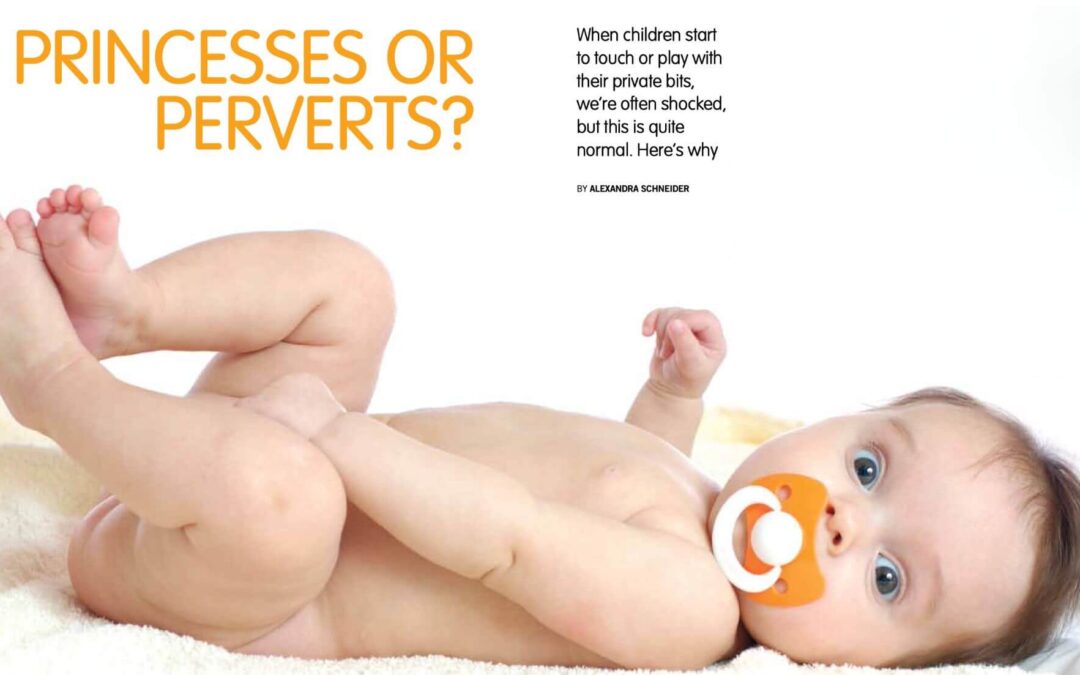When children start to touch or play with their private bits, we‘re often shocked, but this is quite normal. Here‘s why
BY ALEXANDRA SCHNEIDER
To parents of babies and toddlers, the sexual development of their children may seem like a topic that doesn’t carry much relevance now, and something they only need to deal with far into the future. So when very young children start to touch or play with their privates, parents often find themselves faced with a surprising and often emotionally charged experience. Fears around whether their child’s behaviour is normal and questions around how to address early displays of sexual development make it a touchy subject for many.
Why do they do it?
“Exploring the body, including the genitals, is part of normal development,” assures Professor Lorna Jacklin from the Department of Paediatrics at the University of the Witwatersrand. Babies and toddlers are developing a sense of their bodies and their body boundaries so, in this light, investigating their genitals would be like discovering any other body part – and children will do so as soon as they have the opportunity and the ability. “Little boys tend to start reaching for their penises at about seven months old – once they have the coordination,” adds Professor Lorna. “This exploration takes place earlier in boys than girls simply because the penis sticks out, making it more accessible than the vagina.” Accessibility plays a large role so parents can expect to see their children paying much more attention to their genitals when they start potty training and are no longer wearing nappies.
Apart from basic exploration, children will also notice that touching their genitals, whether with their hands or rubbing against objects like stuffed toys or bedding, feels good and can be a source of comfort. Preschool teacher Andrea Schmidt explains, “For children, touching their genitals can be a considerable stress-reliever. Although kids will also often touch themselves when they are tired or just bored.” Christine, mother of Lucas (three) and Maya (five) echoes this; “Lucas will often have his hand on his penis while he drinks his bottle before bedtime and sometimes when he’s just relaxed, playing with his toys, whereas Maya’s is definitely a ‘tired’ thing, she only does it before she goes to sleep.”
So is my little princess going to be a pervert?
Parents who fear that this early sexual behaviour indicates that their child will be promiscuous later in life may rest assured. “It’s so important to recognise that exploring their genitals forms part of children’s development and is by no means an indication of deviant sexual behaviour,” assures Joanna Kleovoulou, a clinical psychologist and director of the PsychMatters Family Therapy Centre in Johannesburg, “and this is as true for little girls as it is for little boys.”
Joanna is touching on is the false notion that boys are somehow more sexual than girls. Mom Christine can relate to this: “The funny thing is that for boys it almost seems comical and acceptable, but if little girls touch their vaginas everyone is really shocked and quite appalled – which doesn’t really seem fair.”
Joanna is touching on is the false notion that boys are somehow more sexual than girls. Mom Christine can relate to this: “The funny thing is that for boys it almost seems comical and acceptable, but if little girls touch their vaginas everyone is really shocked and quite appalled – which doesn’t really seem fair.”
The shock that some parents experience when they witness their children playing with their nether regions it is often because they are viewing it as masturbation in an adult sense. “As parents we need to remember that although genital exploration carries an element of sexual arousal – in that the body responds in a pleasurable way – there is no connotation to sexual activity. This is because children of this age don’t have any sexual knowledge,” explains Joanna.
It’s a private thing
As babies and toddlers also do not yet possess a sense of privacy, it is quite common for them to engage in genital play in public, often causing their parents and bystanders embarrassment. Joanna suggests you approach this calmly.
“With very young children it would be enough to distract them by offering them a toy or engaging them in an alternative activity,” she says. “Then once your child can talk you can start communicating boundaries in simple ways like linking touching genitals only in private to other private practices like closing the door when going to the toilet, or breaking wind when alone.” This way they can begin to understand the difference between social and private activities.
Not to be shared
Generally, up to the age of four years genital discovery is limited to their own body, after this age children do sometimes start involving other children in their
exploration. So it is also a good idea, as a safety precaution, to instill the notion in your child early on that their genitals are theirs alone to touch and that they are not to touch other people’s genitals either. In addition to pointing out this boundary Andrea recommends reinforcing your child’s right to say no to situations that make them uncomfortable and allowing them to uphold their boundaries with confidence. “This will help a child if it is ever caught in a situation where someone (whether adult or another child) could potentially try to coerce them into inappropriate activity,” adds Andrea.
Think before you act
Your reaction, both verbal and non-verbal, communicates a message to your child about your norms and values. Joanna suggests addressing self-stimulating activity consciously and preferably as it occurs (to keep the discussion relevant) and turn the situation into a teaching opportunity. “You don’t want to create shame, guilt or humiliation (especially if you have ‘caught them in the act’), nor do you want to create too big a deal.” Kleovoulou adds: “Acknowledge that what he is doing feels nice. Then you can give him a boundary as to an appropriate
place to be doing that (like alone in the bath or alone in their room) and explain that no one is allowed to touch their genitals and vice versa.” After that you can just carry on with your day as to not overload the situation.
When it’s not normal
If a child is excessively masturbating, rubbing or scratching their genitals, to the extent that they cannot easily be distracted or that their behaviour overrides their interest in ordinary play, there may be another underlying cause. “Little girls who hurt themselves are usually scratching because there is an underlying infection causing them to masturbate,” says Professor Lorna. In such a case a paediatrician would be able to determine any physical cause like a bladder or pinworm infection.
If a child is also mimicking adult sexual behaviour there is a chance they have been abused. “Some other markers that could indicate that there may have been abuse include clinginess and separation anxiety, soiling their pants after being out of nappies for some time and trying to touch others’ private parts,” adds Joanna. If you suspect abuse you can contact a psychologist or an organisation like The Teddy Bear Clinic or Childline for advice.
Resources
The Teddy Bear Clinic: 011 484 4554 or visit the websita at www.ttbc.org.za Childline: 08000 55 555 or visit the websita at www.childline.org.za PsychMatters Family Therapy Centre: 011 4503576 or www.psychmatters.co.za




